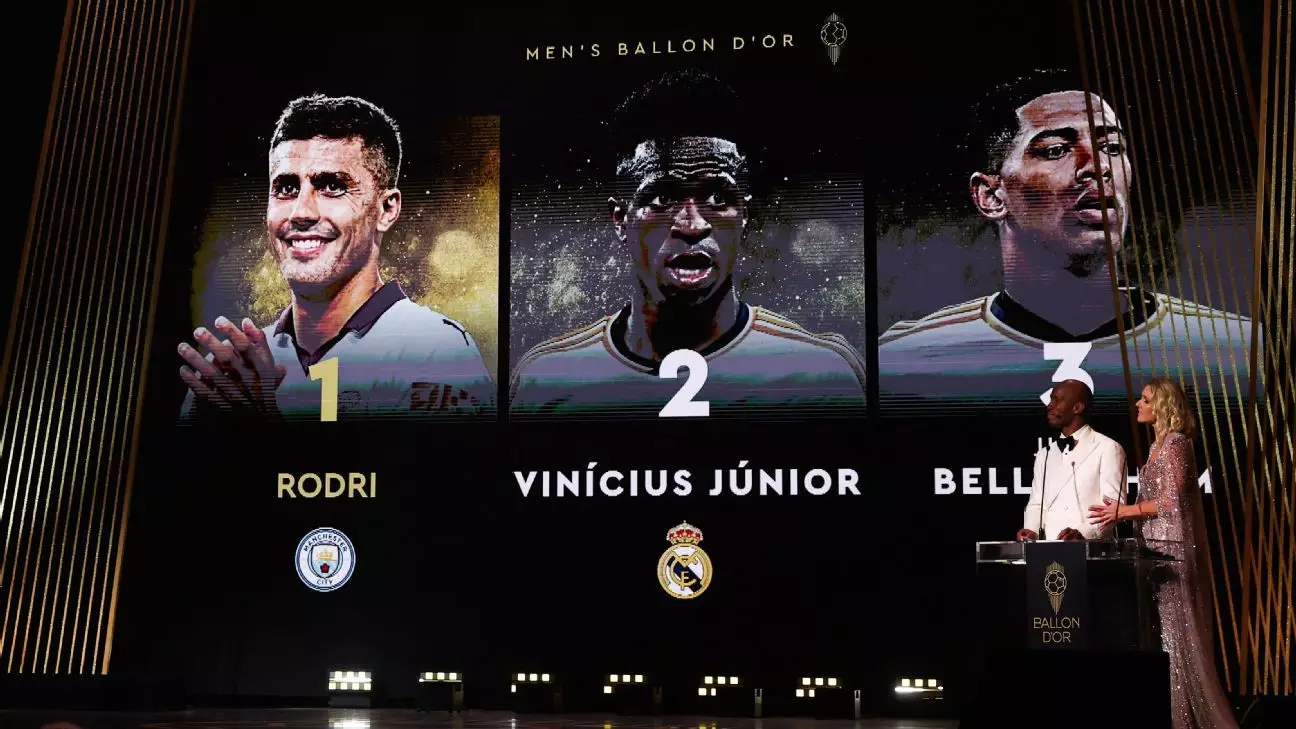While many football enthusiasts eagerly dive into the annual intrigue surrounding the Ballon d’Or, I find myself somewhat detached from its glitzy allure. Despite having followed it since childhood, my priorities have shifted; I place more importance on the tangible accomplishments within the sport rather than accolades often deemed superficial. Yet, I cannot disregard the historical significance and emotional connections the award has fostered over the years. For instance, my introduction to significant yet lesser-known players, such as Sokol Kushta, who secured the 30th position in the 1987 awards, illustrates how these recognitions can leave lasting impressions even on the footnotes of football history.
The Ballon d’Or has traversed decades, serving as a litmus test for football’s elite, where names like Ruud Gullit, Marco Van Basten, and Lothar Matthäus once defined the landscape of the sport. However, the reality remains—today’s players attach immense value to this accolade, often fueled by factors beyond raw performance, tapping into a web of politics, relationships, and even perceived injustices.
The recent dismissal of Real Madrid’s Vinícius Júnior from Ballon d’Or recognition has set off ripples of discontent among players and fans alike. The decision led to a boycott from the club, emphasizing how they interpreted it as a slight not only against Vinícius but also against the institution itself. For Real Madrid, reverence for such events goes beyond mere tradition; it’s intertwined with their identity. The incident attracted widespread commentary from players, including Eduardo Camavinga and Richarlison, asserting that the outcomes of such prestigious awards often reflect deeper football politics.
What’s particularly compelling about this scenario is the perception of a conspiracy against Real Madrid, considered by some to be linked with UEFA’s controversial dealings and the club president’s audacious pursuits like the European Super League. Whether this perception holds truth is debatable, yet the ensuing backlash illuminates how deeply players are engaged in the award’s significance.
In an age defined by digital platforms and evolving modes of engagement, the Ballon d’Or has attracted diverse audiences. When I attempted to tune into the awarding ceremony, I stumbled across a livestream hosted by the popular YouTuber IShowSpeed, whose mass following offers a glimpse into how traditions can morph in contemporary settings. I found it revealing that this casual coverage drew more viewers than the official drinking from Manchester City’s channel—a testament to the diversifying interests and consumption habits of modern fanbases.
IShowSpeed’s presence at the event, sitting in silence alongside influencer Ibai Llanos, exemplified a critical shift. Spectators turned to merely watch two voices commenting less on the very act of awarding and more on the performance of those on stage. This could highlight a broader cultural transformation, where the pomp of traditional awards is overshadowed by personalities that imbue events with a new kind of relevance—one rooted in connection rather than formality.
The meticulous process behind deciding the Ballon d’Or winner, as described by France Football’s editor-in-chief Vincent Garcia, paints a picture of exclusivity that many might find unnecessary. The awarding process, cloaked in secrecy, reinforces the monumental significance attributed to this single fortunate recipient. Yet, one cannot escape the feeling that hyperbole often obscures the authenticity of the recognition.
As Garcia painstakingly manages the critical envelopes supposedly through a highly secured method, the spectacle feels akin to political theater rather than a genuine celebration of sporting accomplishments. Did we really need such elaborate protections when the crux of athleticism is often rooted in the competition itself? Surely, technology could ensure greater efficiency in the voting process without appearing unnecessarily dramatized.
Ultimately, the allure of the Ballon d’Or and similar awards brings forward a profound question: why do these multimillionaire athletes seek validation from a jury they may never encounter? These footballers operate at the highest level, winning trophies and accolades that would be the envy of many, yet they engage in a chase for recognition that seems antithetical to their achievements on the pitch.
Part of this stems from their inherent competitive nature, where every match won can translate into personal accolades. However, there exists a poignant contradiction; they are in a realm where their performances are quantifiable, yet the high-pressure judgment of others remains an unpredictable and often irrelevant variable.
While the Ballon d’Or boasts a rich tradition and fuels considerable excitement among fans, its relevance is frequently questioned in an evolving landscape. The mingling of acknowledgment and politics, the disconnection between achievements and perceptions, and the resulting complexities all weave a narrative worth reevaluating. The essence of sport should, ideally, rest on the field rather than beyond it—making those dynamic moments the true measure of greatness.

